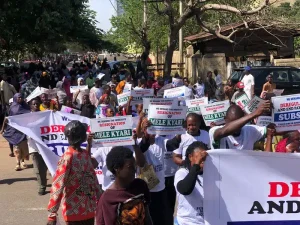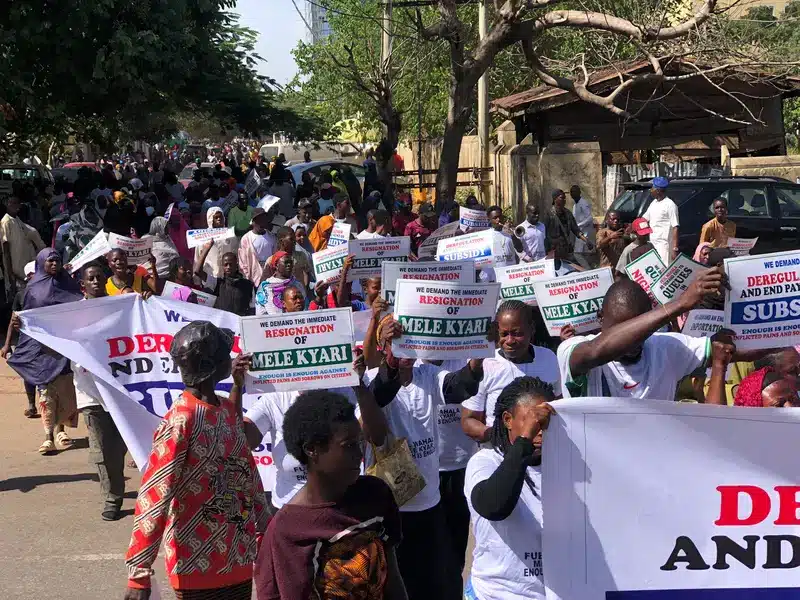Read Time:3 Minute, 31 Second

On Monday, a large-scale protest against rising petrol prices, ongoing fuel shortages, and growing economic hardship was started by scores of Nigerians who assembled in Abuja.
The protesters, led by Barrister Napoleon Otache and Olayemi Isaac from Citizens and Economic Freedom Rights Activists in Nigeria (CEFRAN) and Abdullahi Bilal of the Two Million Man March Against Oil Scam Cabal, called for immediate action to address what they called poor leadership in the nation’s oil sector management.
Central to the protests were grievances over skyrocketing fuel prices and the never-ending queues, which they argued have driven inflation and plunged millions of Nigerians into poverty.
The demonstrators condemned the current fuel subsidy regime, claiming it has only served to enrich a select few while leaving the majority struggling with high prices.
They called for full deregulation in the oil sector to ensure transparency, competition, and fairer fuel pricing.
The protesters criticized the present fuel subsidy system, saying it has mainly benefited a few while leaving the majority struggling with exorbitant costs.
READ ALSO:
ALEX IKWECHEGH MAY SUFFER DOUBLE JEOPARDY OVER ASSAULT – REPS MINORITY LEADER
They demanded complete deregulation of the oil industry in order to guarantee competition, openness, and more equitable fuel prices.
Additionally, the importation of tainted fuel was denounced by protesters as a corrupt operation that damages businesses and automobiles, harming individuals.
They questioned how poor quality fuel keeps getting into the nation in spite of quality control guarantees and called for an immediate stop to these imports as well as accountability for those involved.
The organization also expressed anger over the billions of dollars spent on refinery development and facility renovations, criticizing the Dangote Refinery’s unmet promise to address Nigeria’s gasoline shortage.
They argued that despite these investments, fuel shortages persist, leaving Nigeria reliant on costly imports even as an oil-producing nation.
Highlighting the impact of the fuel crisis on the economy, protesters cited inflation surpassing 24% and a 200% rise in fuel prices, factors they say are deepening poverty across the country.
They called on President Bola Tinubu to step in by reorganizing the oil industry’s leadership, imposing stricter accountability, and prioritizing the interests of the populace. Until their demands for reform and openness are fulfilled, the demonstrators promised to keep up their mobilization.
“Today, we call for the immediate resignation of the current leadership in the country’s oil sector. Their management has failed Nigerians.
“Under their watch, we have seen fuel prices skyrocket without consultation or consideration of the devastating impact on the people. We have endured fuel scarcity while substandard, adulterated fuel is imported, causing further hardship.
“We demand the complete removal of the fraudulent fuel subsidy regime that has only served to enrich a select few. Full deregulation is necessary to introduce transparency, competition, and fairness to our oil sector.
“We also demand an end to the importation of adulterated fuel into Nigeria. This harmful practice must stop immediately, and those responsible must be held accountable for the damage caused to our vehicles, businesses, and livelihoods.
“Nigerians have suffered long enough, wasting hours and days queuing for fuel. We demand a sustainable solution to the fuel scarcity crisis—no more excuses, no more delays. We deserve better.
“We also want to highlight the failure of the much-anticipated refinery. Nigerians were promised that this would solve our fuel crisis, but it has failed to deliver.
“This mismanagement has led to inflation reaching a shocking 24.5% as of November 2024. Fuel prices have increased by over 200%, plunging millions of Nigerians into deeper poverty.
“To the government, we say: enough is enough. Nigerians will not stand by while the oil cabal continues to thrive at the expense of our nation’s welfare. We demand accountability, and we demand it now.”
On their part, Barrister Napoleon Otache and Olayemi Isaac, insisted: “This act of economic sabotage has led to endless fuel queues, skyrocketing fuel prices, and unprecedented disruptions in the daily lives of Nigerians.
“We demand an immediate end to fuel queues, transparency, and accountability from all involved parties. We want to know how substandard fuel continues to enter the country despite assurances of quality control.”

Happy
0
0 %

Sad
0
0 %

Excited
0
0 %

Sleepy
0
0 %

Angry
0
0 %

Surprise
0
0 %


